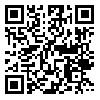BibTeX | RIS | EndNote | Medlars | ProCite | Reference Manager | RefWorks
Send citation to:
URL: http://jdisabilstud.org/article-1-1552-en.html
2- Department of Educational Sciences, Faculty of Educational Sciences and Psychology, University of Sistan and Baluchestan, Zahedan, Iran
3- Department of Psychology, Faculty of Educational Sciences and Psychology, University of Sistan and Baluchestan, Zahedan, Iran
Abstract
Background & Objectives: Aggression is a quite apparent physical behavior, and its purpose is to harm the person or system that avoids others or confronts them like them. Aggression is considered one of the most critical issues in adolescence, while bullying and aggression have many negative consequences. One of the treatments suggested in recent years is spiritual healing. It seems that nowadays, the people of the world are more and more inclined to spirituality and spiritual issues, and psychologists are also increasingly seeing that the use of current methods that focus more on psychological, social, and physical aspects of humans is not enough to cure psychiatric disorders. The purpose of this study was to investigate the effectiveness of group spirituality therapy in reducing the violence of aggressive students in secondary boy schools in Iranshahr City, Iran.
Methods: The current research was quasi-experimental and employed a pretest-posttest design with a control group. The research community was formed by all the aggressive students of secondary boys' schools in Iranshahr who were studying in the academic year 2017-2018. The samples included 40 students who had a higher level of aggression based on the scores of the aggression questionnaire. Then, they were randomly replaced in two groups of 20 students (20 in the control group and 20 in the experimental group). The experimental group participated in spiritual therapy sessions for 4 weeks, two days a week, and each session lasted 60 minutes, but the control group did not receive any treatment. After the end of the treatment period, a posttest was taken from both groups. The tools used in this research included the Aggression Questionnaire (Bass and Perry, 1992) and the Conflict Resolution Tactics (Strauss et al., 1996). Analysis of covariance (ANCOA) test was used to analyze the data in SPSS23.
Results: The findings of the research showed that group spiritual therapy had a significant effect on reducing the violence (p=0.021) and various types of verbal violence (p=0.014), mild physical violence (p=0.031), and severe physical violence (p=0.039) in aggressive students of the experimental group.
Conclusion: According to the findings of this research on the effectiveness of group spiritual therapy in reducing the aggression of aggressive teenagers, the use of this treatment method is recommended to experts in this field.
| Rights and permissions | |
 |
This work is licensed under a Creative Commons Attribution-NonCommercial 4.0 International License. |





